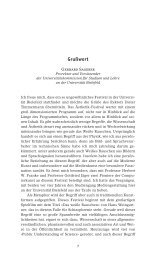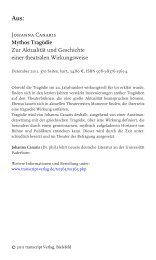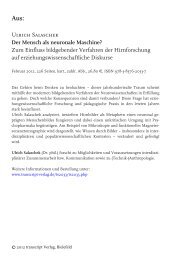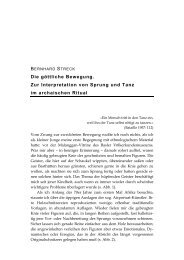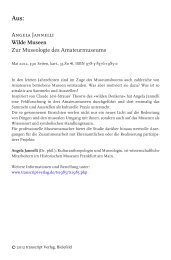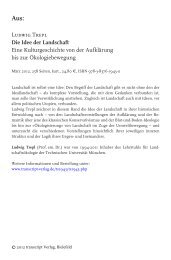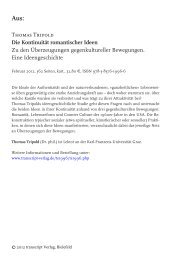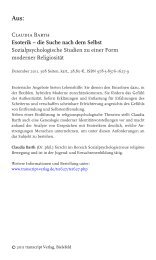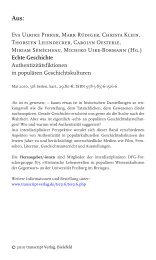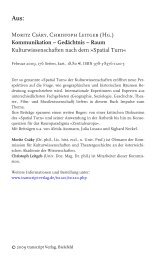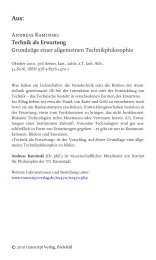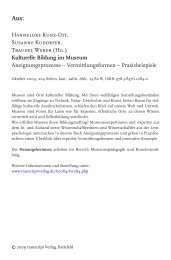Julia Straub (ed.) Paradoxes of Authenticity Studies on a Critical ...
Julia Straub (ed.) Paradoxes of Authenticity Studies on a Critical ...
Julia Straub (ed.) Paradoxes of Authenticity Studies on a Critical ...
Create successful ePaper yourself
Turn your PDF publications into a flip-book with our unique Google optimized e-Paper software.
INTRODUCTION | 19<br />
“more than a nostalgic return” to its older meanings and prop<strong>on</strong>ents<br />
by virtue <str<strong>on</strong>g>of</str<strong>on</strong>g> <str<strong>on</strong>g>of</str<strong>on</strong>g>fering a “revisi<strong>on</strong> <str<strong>on</strong>g>of</str<strong>on</strong>g> postmodernism” (Haselstein/Gross/<br />
Körber, “Introducti<strong>on</strong>” 19). This seems to be quite a big burden plac<str<strong>on</strong>g>ed</str<strong>on</strong>g><br />
<strong>on</strong> a fraught and fragile c<strong>on</strong>cept. However, any such approach sets us<br />
<strong>on</strong> a right track by exploring its positive value for analyses <str<strong>on</strong>g>of</str<strong>on</strong>g> literary<br />
texts, films or images. In fact, n<strong>on</strong>e <str<strong>on</strong>g>of</str<strong>on</strong>g> the above questi<strong>on</strong>s can be answer<str<strong>on</strong>g>ed</str<strong>on</strong>g><br />
by nodding towards its postmodernist playfulness, by <strong>on</strong>ly<br />
dwelling <strong>on</strong> its paradoxes or by hastily dismissing it as a fast track into<br />
the essentialist trap. It is against the backdrop <str<strong>on</strong>g>of</str<strong>on</strong>g> c<strong>on</strong>flicting demands<br />
– sceptical awareness <str<strong>on</strong>g>of</str<strong>on</strong>g> the term’s polyvalence versus an<br />
acutely perceiv<str<strong>on</strong>g>ed</str<strong>on</strong>g> ne<str<strong>on</strong>g>ed</str<strong>on</strong>g> for an affirmative revaluati<strong>on</strong> – that it ne<str<strong>on</strong>g>ed</str<strong>on</strong>g>s to<br />
be employ<str<strong>on</strong>g>ed</str<strong>on</strong>g>. Each <str<strong>on</strong>g>of</str<strong>on</strong>g> the essays includ<str<strong>on</strong>g>ed</str<strong>on</strong>g> in this collecti<strong>on</strong>, opens up<br />
in its own ways a can <str<strong>on</strong>g>of</str<strong>on</strong>g> worms. It is <strong>on</strong>ly in alliance with existing and<br />
future studies <strong>on</strong> the subject matter that this collecti<strong>on</strong> can positi<strong>on</strong> itself<br />
as part <str<strong>on</strong>g>of</str<strong>on</strong>g> a joint effort. To show how authenticity, a c<strong>on</strong>cept not<br />
entirely hollow<str<strong>on</strong>g>ed</str<strong>on</strong>g> out by postmodernist critique, can be rec<strong>on</strong>cil<str<strong>on</strong>g>ed</str<strong>on</strong>g><br />
with the shifting epistemological frames, changing producti<strong>on</strong> and reproducti<strong>on</strong><br />
possibilities, new paradigms <str<strong>on</strong>g>of</str<strong>on</strong>g> representati<strong>on</strong> and noti<strong>on</strong>s<br />
<str<strong>on</strong>g>of</str<strong>on</strong>g> subjectivity arising in the twentieth and twenty-first centuries is <strong>on</strong>e<br />
<str<strong>on</strong>g>of</str<strong>on</strong>g> the ambiti<strong>on</strong>s <str<strong>on</strong>g>of</str<strong>on</strong>g> this essay collecti<strong>on</strong>.<br />
THIS COLLECTION OF ESSAYS<br />
Mapping <str<strong>on</strong>g>Authenticity</str<strong>on</strong>g><br />
To begin with, the c<strong>on</strong>tributi<strong>on</strong>s by Aleida Assmann, Susanne Knaller<br />
and Thomas Claviez are meant to map and pull together some <str<strong>on</strong>g>of</str<strong>on</strong>g> the<br />
central debates, questi<strong>on</strong>s and fields <str<strong>on</strong>g>of</str<strong>on</strong>g> investigati<strong>on</strong> that have develop<str<strong>on</strong>g>ed</str<strong>on</strong>g><br />
around authenticity.<br />
Aleida Assmann describes the history <str<strong>on</strong>g>of</str<strong>on</strong>g> authenticity as a c<strong>on</strong>cept<br />
that has been inherent to central Western discourses about the self.<br />
Elaborating <strong>on</strong> Plato’s Socratic dialogues in Pha<str<strong>on</strong>g>ed</str<strong>on</strong>g>rus and Parmenides<br />
and William Shakespeare’s Hamlet, Aleida Assmann shows that<br />
the historical dimensi<strong>on</strong> <str<strong>on</strong>g>of</str<strong>on</strong>g> the term is crucial for an understanding<br />
and interpretati<strong>on</strong> <str<strong>on</strong>g>of</str<strong>on</strong>g> Western culture. The distincti<strong>on</strong> between seeming<br />
and being, which she c<strong>on</strong>ceptualizes as the “Plat<strong>on</strong>ic distincti<strong>on</strong>”



